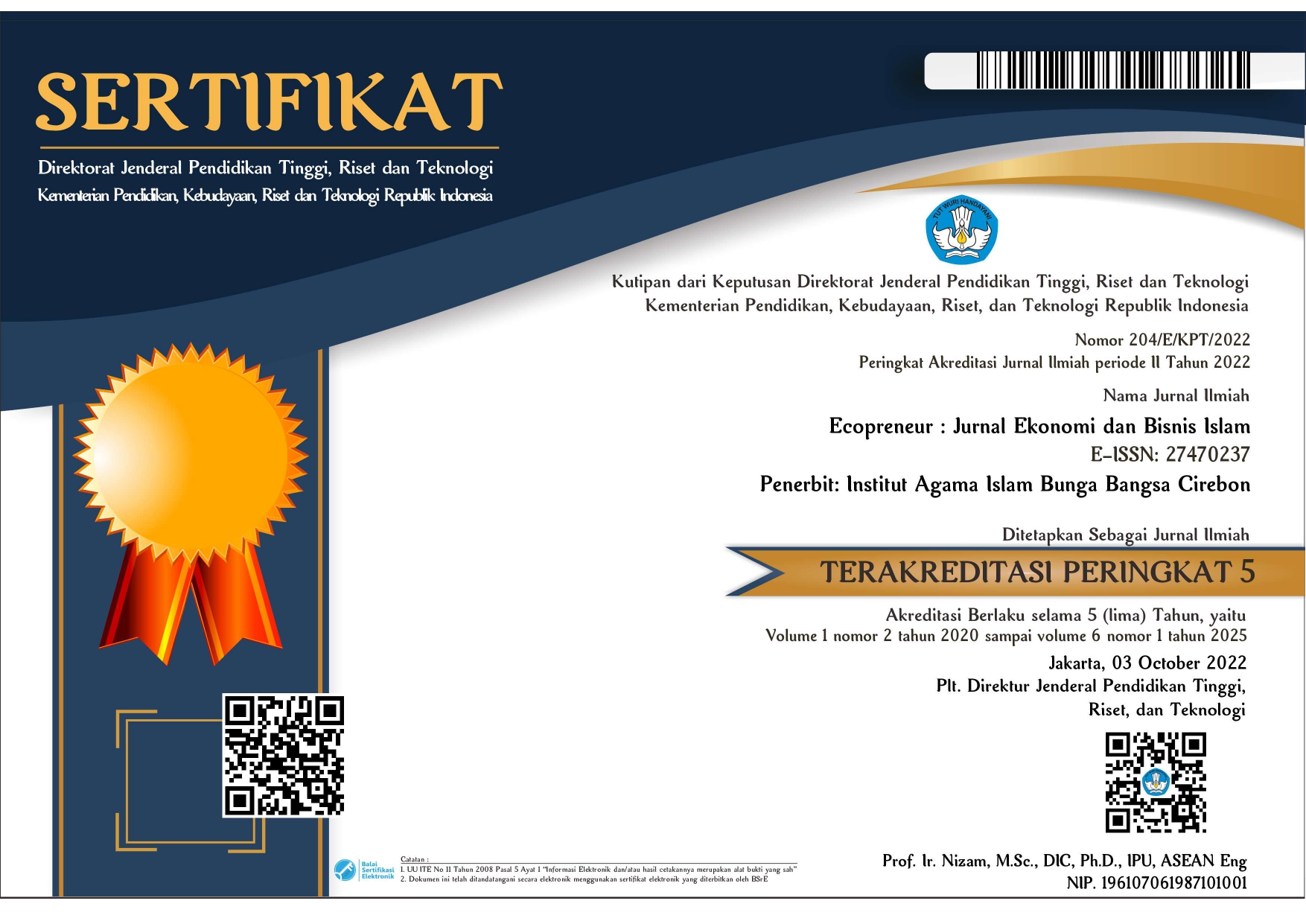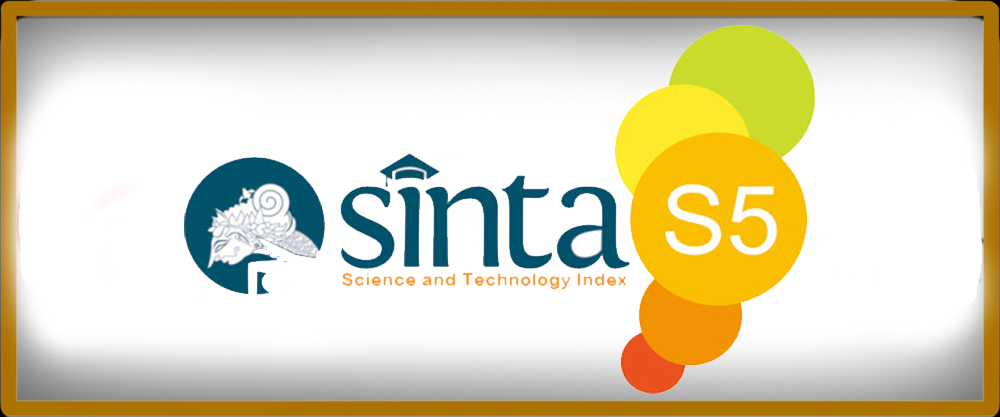Konsep Perilaku Produsen dan Produksi Dalam Al-Qur’an (Kajian Penafsiran Surah Al-Maidah/5:87)
Abstract
Humans were created to need other people, as well as to fulfill their needs, of course we need people around us to exchange information and help each other and to be able to communicate well.This research aims to examine producers behavior and production concepts in an overview of the interpretation of Q.S al-Maidah verse 87. This research includes a qualitative approach where it is necessary to deepen understanding focusing on the object of research, after which understanding is obtained, reasoning is carried out and meaning is explained in detail. The approach used in this research is the tafsir science approach using the tahlili method. The results of this research show that Q.S al-Maidah verse 87 which means that Allah swt. has determined things that are haram and halal and does not like excessive things, therefore this surah can be used as a basic guideline in production activities and producer behavior.
Keywords: Tafsir Surah al-Maidah/5:87, Concept of Producer Behavior, Production in Qur’an
Manusia diciptakan dengan memerlukan orang lain, begitupun dalam pemenuhan kebutuhannya tentu kita memerlukan orang sekitar untuk saling menukar informasi dan saling membantu serta dapat berkomunikasi dengan baik. Penelitian ini bertujuan untuk mengkaji tentang perilaku produsen serta konsep produksi dalam overview terhadap tafsiran Q.S al-Maidah ayat 87. Pendekatan kualitatif yang digunakan dengan metode studi pustaka yang dapat dilakukan dengan menelaah buku-buku, jurnal, karya tulis ilmiah, serta sumber lainnya. Pendekatan yang digunakan dalam penelitian ini ialah pendekatan ilmu tafsir dengan metode tahlili. Hasil dari penelitian ini menunjukkan bahwa dalam Q.S al-Maidah ayat 87 yang memiliki makna bahwa Allah swt. telah menetapkan hal-hal yang haram dan halal dan tidak menyukai hal yang berlebihan untuk itu surah ini dapat dijadikan pedoman dasar dalam aktivitas produksi dan perilaku produsen.
Kata Kunci: Tafsir Surah al-Maidah/5:87, Konsep Perilaku Produsen, Produksi Dalam Al-Qur’an
Downloads
References
Khozin, A. A., Pratama, F. A., Ridwan, M., Amin, N. M. F., & Lesmana, T. (2022). Inflation and the Stability of Islamic Finance. ICOBBA_2021, 404-409.
Marleni, E., Mustoip, S., & Sulkhah, S. (2024). Implementation of the Literacy Movement in Shaping Student Character in Elementary School. EduBase: Journal of Basic Education, 5(2), 120-130.
Munajim, A., Pratama, F. A., Ridwan, M., & Rohimah, I. (2022). The Operations of the Bank Wakaf Micro Indonesia with the Scheme for the Economic Empowerment of the People. ICOBBA_2021, 1-6.
Nasir, A., Busthomi, A. O., & Rismaya, E. (2022). Shariah Tourism Based on Local Wisdom: Religious, Income, Motivation, Demand and Value of Willingness to Pay (WTP). International Journal Of Social Science And Human Research, 5(08), 3811-3816.
Pratama, F. A., Ridwan, M., Yulianti, N., Ratnawati, R., Maulana, A., & Masitoh, S. I. (2022). Implementasi Persamaan Fungsi Non Linier Dalam Matematika Bisnis Pada Kehidupan Sehari-Hari. Change Think Journal, 1(03), 289-299.
Pratama, G. (2022). Comparative Study of The Empowerment of Zakat BAZNAS Indonesia and PPZ Malaysia. ICOBBA_2021, 212-216.
Putri, Y. D. S., Mustoip, S., Nisa, D. H., & Ramadhani, N. U. (2024). Implementation of Audiolingual Methods in Understanding Arabic Color Concepts in Class I SDIT Alif Mardiyah. JPS: Journal of Primary School, 1(2), 1-6.
Ridwan, M., Motik, D. P., & Nurwahid, H. I. (2022). Afzalur Rahman's Thinking Concept: Relevance with Worker Ethics According to Global Standards. ICOBBA_2021, 322-329.
Selasi, D., Agustiani, L. R., & Vidiati, C. (2022). Upaya Mengubah Pendapatan Usaha Mikro Kecil Menengah (UMKM) Melalui Digital Marketing. Jurnal Multidisiplin Madani, 2(3), 1247-1258.
Selasi, D., Munajim, A., & Komala, S. I. (2022). The Digitization of Islamic Philanthrophy In the Islamic Capital Market in Indonesia. ICOBBA_2021, 166-174.
Selasi, D., Munajim, A., & Komala, S. I. (2022). The Digitization of Islamic Philanthrophy In the Islamic Capital Market in Indonesia. ICOBBA_2021, 166-174.
Selasi, D., Muzayyanah, M., Tatmimah, I., Sari, F., & Indriyani, R. (2022). Contribution of Islamic Capital Market to National Capital Market. INCOME: Innovation of Economics and Management, 2(1), 1-7.
Selasi, D., Vidiati, C., & Munajim, A. (2022). Pertumbuhan Bank Syariah di ASEAN: Dalam Sejarah The Growth of Islamic Banks in ASEAN: In History. Ecobankers: Journal of Economy and Banking, 3(2), 157-171.
Selasi, D., Vidiati, C., & Munajim, A. (2022). Pertumbuhan Bank Syariah di ASEAN: Dalam Sejarah The Growth of Islamic Banks in ASEAN: In History. Ecobankers: Journal of Economy and Banking, 3(2), 157-171.
Selasi, D., Vidiati, C., & Sumarno, S. (2022). Pasar Menabung Saham Pada Pasar Modal Indonesia. Ecopreneur: Jurnal Ekonomi dan Bisnis Islam, 3(1), 68-77.
Selasi, D., Vidiati, C., & Tardjono, T. (2022). Sharia Capital Market: Securities Fatwa, Derivative Securities and Mechanisms. IJOBBA: International Journal of Bunga Bangsa Cirebon, 1(1), 1-24.
Selasi, D., Virdiati, C., Munajim, A., & Sujata, T. (2022). Kesejahteraan Masyarakat: Analisa Kualitatif Sistem Keuangan Komersial Islam-SIstem Keuangan Sosial Islam di Indonesia.
Stefanus, S., & Ridwan, M. (2022). Analisis Strategi Marketing Syariah Untuk Meningkatkan Omset Penjualan Pada Era Globalisasi Di Toko Emas Pantes Sindang Laut Kabupaten Cirebon. Change Think Journal, 1(01), 87-95.
Vidiati, C., Al-Ghozali, M. I., Faturrizky, I., Selasi, D., Munajim, A., & Tardjono, T. (2022). Effects of the Money Market and the Need for Knowledge of Interest Rates and the Foreign Exchange Market for Benefit: Evidence In Indonesia. IJOBBA: International Journal of Bunga Bangsa Cirebon, 1(1), 37-60.
Vidiati, C., Hendra, E., Selasi, D., & Sumarno, S. (2022). Menilik Tas’ ir Keadilan dan Maslahah. Ecopreneur: Jurnal Ekonomi dan Bisnis Islam, 3(1), 78-92.
Wartoyo, W., Haida, N., Mujab, S., & Umam, M. K. (2022). Sharia Marketing Model Pada Bisnis Laundry Syariah (Case Study Pada Zada Laundry Syariah Sumber Cirebon). PROFIT: Jurnal Kajian Ekonomi Dan Perbankan Syariah, 6(1).












